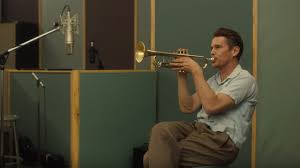
In Born to Be Blue, Ethan Hawke plays jazzman Chet Baker as he seeks to overcome his heroin addiction and mount an artistic comeback.
Writer-director Robert Budreau made the successful choice to start the story when Baker had hit bottom in the mid-1960s. Baker is relearning how to play the trumpet after his teeth were smashed by an angry creditor. Now he’s living in his girlfriend’s VW van and playing for free in a pizza joint, trying to work his way back up to a marquee venue and a recording deal. We see his 1950s glory days in flashback.
In a typically outstanding performance, Ethan Hawke makes us root for this guy, even as we cringe at the likelihood that his disease is going to find a way to destroy him. If you’ve seen Before the Devil Knows You’re Dead, you know that Hawke is a master at playing unreliable characters – which makes him a perfect choice for a junkie like Chet Baker. Still, in a bowling alley scene, we glimpse the Chet Baker charm that could attract a woman who certainly knew better. Hawke convincingly fingers the horn as we hear the real Chet Baker play; Hawke himself sings on Baker’s signature vocal numbers Over the Rainbow and My Funny Valentine.
Carmen Ejogo (Coretta Scott King in Selma) is also excellent as two of the women in Baker’s life.
This movie’s elephant in the room is Baker’s addiction to heroin, about which he says, “It makes me happy”. Some very incisive scenes with his father hint at the roots of Baker’s disquiet. The people closest to Baker want him to kick the habit, but, unfortunately, more than he wants to himself. As he clings on with his fingerprints, Born to Be Blue is achingly effective.
